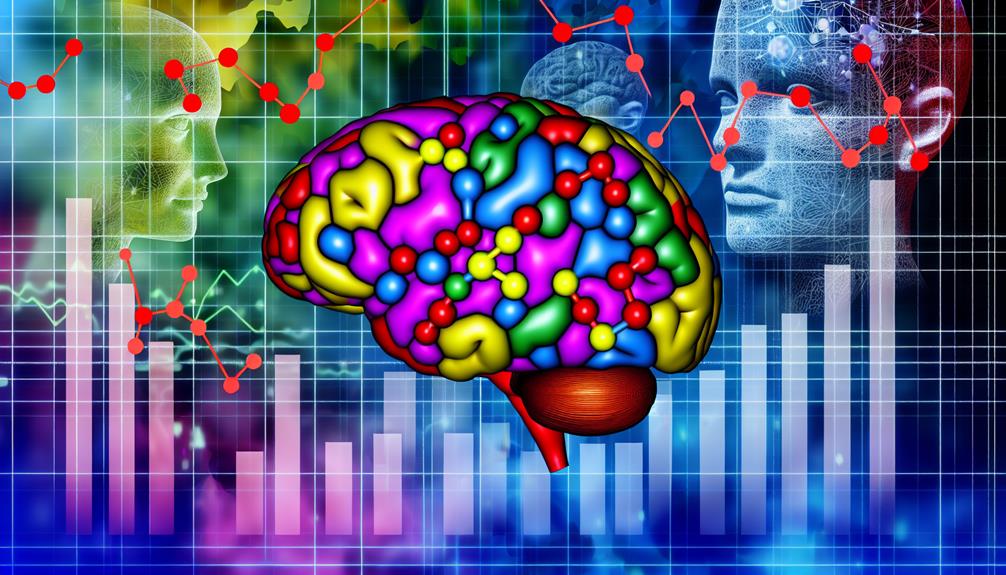It's essential for men to understand how hormones like testosterone and cortisol impact mental health. Low testosterone can cause irritability and fatigue, while high cortisol levels often lead to anxiety and cognitive issues. It's normal for hormones to fluctuate due to age or lifestyle, but imbalances can be detrimental to emotional well-being. Practicing good sleep habits, regular exercise, and mindfulness can help regulate these hormones. If you're feeling overwhelmed, seeking professional help is a strong step forward. By exploring these aspects further, you'll uncover more strategies to enhance your mental health and overall emotional resilience.
Understanding Hormones

When we think about hormones, it's easy to overlook just how influential they are in our daily lives—especially for men. I've spent a lot of time diving into the complexities of the endocrine system, and I can tell you that it's a fascinating yet intricate network that regulates everything from mood to energy levels. Hormones interact in ways that can feel overwhelming, but understanding these hormonal interactions is essential for maintaining mental health.
For men, testosterone often takes center stage, but it's important to recognize that other hormones, such as cortisol, insulin, and serotonin, also play significant roles. These hormones don't work in isolation; instead, they're part of an elaborate system that communicates constantly. For instance, when stress triggers cortisol release, it can impact testosterone levels, leading to fatigue or irritability, which can spiral into bigger mental health issues if not addressed.
It's important to remember that fluctuations in hormone levels are normal and can be influenced by various factors like age, diet, and lifestyle. I've learned that even minor imbalances can affect emotional well-being, leading to anxiety or depression. By recognizing and understanding these hormonal interactions, we can take proactive steps to nurture our mental health. Whether that means seeking professional help, adjusting our diet, or simply being more aware of our bodies, knowledge is the first step toward better well-being.
The Role of Testosterone
When we talk about testosterone, it's essential to understand how it influences our mood and mental health. Research shows that fluctuations in testosterone levels can considerably impact anxiety and depression symptoms, affecting how we feel day-to-day. By exploring this connection, we can better comprehend the role hormones play in our emotional well-being.
Testosterone and Mood Regulation
Testosterone plays a crucial role in shaping not just physical health but also emotional well-being. It's fascinating how this hormone influences our mood regulation. I've learned that testosterone fluctuations can lead to significant mood swings, affecting everything from motivation to overall happiness. When testosterone levels dip, I've noticed that many men, including myself, can experience irritability or sadness.
Research indicates that stable testosterone levels contribute to emotional stability. If you're experiencing fluctuations, it's essential to recognize how that might be impacting your mood. Some men might find themselves feeling on edge or unusually fatigued during low testosterone phases, which can be confusing and frustrating.
I encourage you to pay attention to your body and emotions. If mood swings become a pattern, it might be worth consulting a healthcare professional. They can offer guidance on managing testosterone levels, whether through lifestyle changes or other interventions. Understanding the connection between testosterone and mood can empower you to take control of your emotional health. Remember, you're not alone in this journey, and seeking support is a strong step towards feeling better.
Effects on Anxiety Levels
Have you ever considered how fluctuations in testosterone might impact your anxiety levels? As men, we often overlook the connection between our hormones and mental health. Research shows that hormonal fluctuations can substantially influence our anxiety triggers. When testosterone levels drop, many of us may experience heightened feelings of anxiety and stress.
To help you understand this better, I've put together a table highlighting the relationship between testosterone levels and anxiety:
| Testosterone Level | Anxiety Symptoms | Potential Triggers |
|---|---|---|
| High | Reduced anxiety, increased confidence | Positive life events |
| Normal | Balanced mood, manageable anxiety | Daily stressors |
| Low | Increased anxiety, irritability | Hormonal fluctuations, life changes |
| Very Low | Severe anxiety, depression symptoms | Health issues, notable stress |
| Fluctuating | Mood swings, unpredictable anxiety | Environmental changes |
Recognizing these patterns can empower you to address your anxiety proactively. If you find yourself struggling, consider discussing your symptoms with a healthcare professional. Understanding your hormonal health is an essential step toward managing anxiety effectively.
Impact on Depression Symptoms
Many men might not realize that fluctuations in testosterone can considerably influence depression symptoms. I've seen firsthand how these hormonal fluctuations can lead to mood swings, leaving us feeling low and unmotivated. Research supports this; lower testosterone levels are often linked to increased feelings of sadness and irritability, which are key components of depression.
When testosterone levels drop, it can disrupt our emotional balance. You might find yourself feeling more anxious or experiencing fatigue, making it hard to engage in activities you once enjoyed. It's not just about feeling down; the impact on your overall mental health can be significant.
Understanding this connection is crucial. If you notice changes in your mood or energy levels, it's worth exploring your hormone levels with a healthcare professional. They can provide insights and potential solutions tailored to your needs.
Taking charge of our hormonal health can lead to better emotional resilience and overall well-being. Remember, you're not alone in this struggle, and recognizing the role of testosterone might be the first step toward regaining control over your mental health.
Impact of Cortisol

Cortisol often plays a notable role in our mental health, especially during stressful times. As I've learned, this hormone is often dubbed the "stress hormone" because our bodies release it in response to stress. When cortisol levels remain elevated for too long, it can wreak havoc on our mental well-being, leading to issues like anxiety, depression, and even cognitive decline.
It's imperative to understand that cortisol regulation isn't just about managing stress; it's about maintaining a balance that allows us to function effectively. High cortisol levels can disrupt sleep patterns, impair memory, and lead to irritability. In my journey to better mental health, I found that recognizing the signs of chronic stress was the first step toward effective management.
Managing cortisol levels involves adopting healthy lifestyle choices. Regular exercise, a balanced diet, and adequate sleep can greatly aid in cortisol regulation. Mindfulness practices, such as meditation or yoga, also help lower stress and bring those cortisol levels back to a healthy range.
If you're feeling overwhelmed, it's essential to check in with yourself and consider how stress is affecting your life. Seeking professional help can also be a game-changer. Understanding cortisol's impact on our mental health can empower us to make informed choices, ultimately leading to a more balanced life. Remember, it's okay to ask for help when you need it. You're not alone in this journey.
Other Key Hormones
As we explore other key hormones, it's important to recognize how testosterone can greatly influence mood and emotional health. I've found that cortisol, often linked to stress, can further complicate these dynamics, while estrogen also plays a role in emotional well-being, even in men. Understanding these hormones can help us navigate the intricate relationship between our mental health and hormonal balance.
Testosterone and Mood
Testosterone plays a essential role in shaping not just physical strength but also our emotional well-being. As I've learned, maintaining healthy testosterone levels can considerably influence mood and emotional stability. When testosterone dips, it can lead to noticeable mood fluctuations that many men experience but might not fully understand.
Here are some effects of low testosterone levels on mood:
- Increased irritability or frustration
- Feelings of sadness or depression
- Difficulty concentrating or making decisions
- Decreased motivation or energy
- Heightened anxiety or stress
Studies show that testosterone levels directly affect neurotransmitters like serotonin and dopamine, which regulate mood. This connection means that when testosterone levels drop, our emotional state can suffer. It's essential to recognize these signs and consider how they might relate to hormonal changes.
If you're experiencing mood fluctuations or emotional challenges, it's imperative to consult a healthcare professional. They can help assess your testosterone levels and explore potential treatments or lifestyle changes to restore balance. Remember, acknowledging these issues is the first step towards reclaiming your emotional health and well-being.
Cortisol's Impact on Stress
When we talk about hormones and their effects on our mental health, we can't overlook the role of cortisol. Often dubbed the "stress hormone," cortisol is essential for our body's response to stress. It helps regulate various functions, but when levels remain elevated due to chronic stress, it can wreak havoc on our mental well-being.
I've learned that understanding cortisol regulation is important for effective stress management. Elevated cortisol levels can lead to anxiety, depression, and cognitive difficulties, making it necessary to recognize when our bodies are under stress. It's not just about feeling overwhelmed; it's about what that stress does to us physiologically.
To keep cortisol in check, I've found that incorporating regular physical activity, practicing mindfulness, and ensuring a healthy sleep routine can greatly help. Additionally, maintaining a balanced diet rich in nutrients plays an important role in hormone regulation. By actively managing stress, we can help keep cortisol levels in a healthier range, ultimately supporting our mental health.
Estrogen and Emotional Well-being
Estrogen plays a significant role in shaping emotional well-being, influencing not just physical health but also mental states. While often associated with women, men also have estrogen, and its effects can be meaningful. Understanding these estrogen effects can provide essential emotional insights that help us navigate our own mental health.
Consider the ways estrogen can impact us:
- Mood Regulation: Estrogen helps stabilize mood swings and can promote feelings of happiness.
- Anxiety Reduction: Higher estrogen levels are linked to lower anxiety, making it easier to cope with stress.
- Cognitive Function: It supports memory and cognitive processes, enhancing overall mental clarity.
- Social Interactions: Estrogen plays a role in fostering empathy and social bonding, which are vital for relationships.
- Physical Health: Affects energy levels and physical well-being, which can directly influence emotional states.
Recognizing these connections can empower us to better understand our emotional health. If we acknowledge the role of estrogen, it can lead to more informed conversations about mental health, allowing us to seek support when needed and ultimately enhance our emotional well-being.
Hormonal Imbalances

Hormonal imbalances can feel like a silent storm brewing within, affecting not just physical health but also mental well-being. I know firsthand how these fluctuations can disrupt our lives, leaving us feeling anxious, irritable, or fatigued. It's essential to recognize that our endocrine health plays a significant role in regulating emotions and mood.
Understanding the impact of hormonal fluctuations can help us navigate these challenges more effectively. Here's a simple table that highlights some common hormonal imbalances and their effects:
| Hormonal Imbalance | Potential Effects on Mental Health |
|---|---|
| Low Testosterone | Fatigue, depression, decreased motivation |
| High Cortisol | Anxiety, irritability, sleep disturbances |
| Low Thyroid Hormones | Depression, cognitive decline, fatigue |
Each of these imbalances can manifest in unique ways, and it's not just about the physical symptoms. It's essential to listen to our bodies and acknowledge the emotional toll these changes can take. Mental health issues often stem from unrecognized hormonal shifts, leading to a cycle of frustration and despair.
If you're experiencing these symptoms, you're not alone. Understanding the connection between hormonal imbalances and mental health can empower you to seek the right support. Remember, addressing endocrine health is as important as focusing on physical fitness; both are interconnected and essential for overall well-being.
Strategies for Balance
Finding balance in life can often feel like a challenging task, especially when dealing with hormonal fluctuations. I've experienced firsthand how important it is to adopt strategies that promote stability in both mental and physical health. With the right lifestyle adjustments, you can greatly impact your overall well-being. Here are some practical strategies that have helped me:
- Prioritize Sleep Hygiene: Aim for 7-9 hours of quality sleep each night to support hormonal balance.
- Incorporate Exercise Benefits: Regular physical activity not only boosts mood but also helps regulate hormones.
- Mindfulness Practices: Techniques like meditation and deep breathing can reduce stress and improve mental clarity.
- Evaluate Dietary Influences: Focus on a balanced diet rich in whole foods, healthy fats, and lean proteins to nourish your body.
- Establish Social Support: Surrounding yourself with friends and family can provide emotional sustenance during tough times.
Don't underestimate the power of routine evaluation, whether it's reviewing your stress management techniques or considering how you spend your time. Small adjustments can lead to substantial improvements in how you feel. Remember, it's about finding what works best for you and being open to change. By implementing these strategies, you can create a more balanced life, which ultimately fosters better mental health and a greater sense of well-being.
Seeking Professional Help

Seeking support can be a pivotal step in managing mental health, especially when hormonal changes contribute to feelings of imbalance. I know it can feel overwhelming to reach out, but acknowledging the need for help is a sign of strength, not weakness. Often, we underestimate the impact hormones have on our moods and overall well-being.
When I sought professional help, I discovered various therapy options tailored to address these unique challenges. Cognitive Behavioral Therapy (CBT) is particularly effective, as it helps to reframe negative thought patterns often exacerbated by hormonal fluctuations. Other approaches, like mindfulness-based therapy, can also be beneficial in cultivating a sense of calm amidst emotional turmoil.
It's essential to find a mental health professional who understands the interplay between hormones and mental health. A qualified therapist can guide you through the process, offering tools and strategies to navigate these changes. Sometimes, they might even recommend collaborating with a healthcare provider to assess and address hormonal imbalances directly.
Frequently Asked Questions
How Do Lifestyle Choices Affect Hormone Levels in Men?
Think of your hormones like a finely tuned orchestra; every lifestyle choice plays an instrument. I've noticed that regular exercise can dramatically impact hormone levels, much like a conductor guiding the tempo. On the flip side, poor sleep quality can throw everything out of harmony. It's essential to prioritize both physical activity and restful nights to maintain that balance. When I make these choices, I feel more energized and mentally sharp.
Can Diet Influence Mental Health Related to Hormones?
Absolutely, I believe diet plays an essential role in our mental health, especially when it comes to hormonal balance. I've noticed that certain foods can have significant dietary impacts on mood and stress levels. For instance, incorporating healthy fats, like omega-3s, can support brain function and hormone production. It's fascinating how what we eat can influence our overall well-being. By making mindful food choices, we can help maintain a healthier balance in our bodies and minds.
What Age-Related Hormonal Changes Should Men Anticipate?
You might think hormonal changes only affect women, but men experience them too. As I've learned, around my 40s, I started noticing andropause symptoms linked to testosterone decline and estrogen increase. This hormonal imbalance can lead to fatigue, mood swings, and even decreased libido. It's important to understand these changes to address them effectively. Staying informed can help us navigate this phase and maintain our mental and physical well-being.
Are There Natural Supplements for Hormone Balance?
I've often wondered about natural supplements for hormone balance, and I've found that herbal remedies like ashwagandha and maca can offer hormone support. These adaptogens may help reduce stress and improve overall well-being, which can positively impact hormone levels. It's important to consult a healthcare professional before starting any new supplement regimen, as individual needs vary. With the right approach, these natural options might be a valuable addition to your health journey.
How Can Stress Management Techniques Improve Hormonal Health?
I've found that stress management techniques can markedly improve hormonal health. By incorporating mindfulness practices into my daily routine, I've noticed a reduction in cortisol levels, which is essential since high cortisol can negatively impact hormones. Techniques like meditation and deep breathing help me stay grounded and focused, ultimately fostering a better hormonal balance. It's amazing how a little awareness and self-care can lead to such positive changes in overall well-being.
